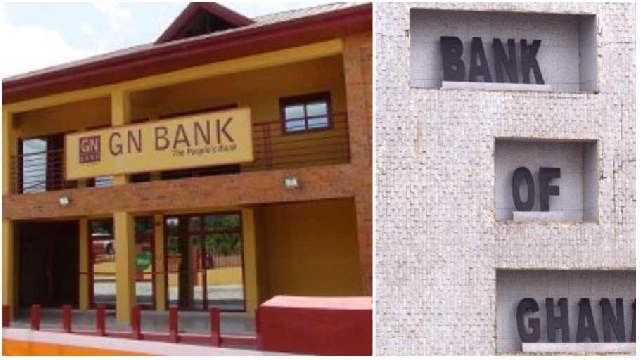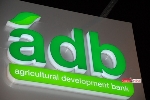Recap: BoG explains revocation of GN Savings and Loans' licence
 Defunct GN Bank building
Defunct GN Bank building
Group Ndoum has recently been in the news, claiming it was unjust for the Bank of Ghana to revoke the license of GN Savings and Loans Limited.
The founder and CEO of the defunct bank, Dr Papa Kwesi Nduom argued that the government’s indebtedness to the bank through locked-up funds from contractors led to the bank’s insolvency. The CEO stated that if the government had paid the debt it owed to the contractors, the bank would have been in a better financial position during the period when the license was revoked.
Dr Ndoum, who has been campaigning for the revival of GN Savings and Loans, says he has initiated steps to recover its banking license in a bid to resume operations across Ghana.
The Vice President of Group Ndoum, Nana Ofori Owusu, pointed out that, unlike other banks that were dissolved, GN Bank—before it was reclassified as a savings and loans institution and subsequently collapsed—never received a bailout from the Central Bank.
Meanwhile, the Bank of Ghana at the time provided detailed reasons for revoking the license of GN Savings and Loans.
Below is the central bank’s detailed explanation:
Licence revocation of GN Savings and Loans Limited
The Bank of Ghana (BoG) on August 16, 2019 revoked the licences of twenty-three (23) insolvent savings and loans companies and finance house companies. These actions were taken pursuant to Section 123 (1) of the Banks and Specialised Deposit-Taking Institutions Act, 2016 (Act 930), which requires the BoG to revoke the licence of a Bank or Specialised Deposit-Taking Institution (SDI) where the BoG determines that the institution is insolvent. The BoG also appointed a Receiver for the specified institutions in line with section 123 (2) of Act 930.
The Bank of Ghana explained that the revocation of the licences of the institutions had become necessary because they were insolvent even after a reasonable period within which it had engaged with them in the hope that they would be recapitalised by their shareholders to return them to solvency. The BoG gave reasons for the revocation of the licence of each of the institutions mentioned on the list. Below are the reasons for the revocation of the licence of GN Savings and Loans Company.
GN SAVINGS AND LOANS LTD. (Statement of August 16, 2019)
GN Savings and Loans Company Limited was originally incorporated as First National Savings and Loans (FNSL) Company Limited and licensed as a Savings and Loans Company on 8th May 2006. It was subsequently issued with a universal banking license by the Bank of Ghana on 4th September 2014 and was renamed GN Bank Limited.
On 4th January 2019, the Bank of Ghana approved a request to reclassify GN Bank from a universal bank to a Savings and Loans company following its inability to meet new required minimum paid-up capital of GH¢ 400 million by 31st December 2018. The reclassification was to among other things enable the institution to downsize its operations and also inject additional capital to resolve the acute liquidity challenges it was confronted with. The Bank of Ghana subsequently appointed an Advisor to GN to assist in the reclassification process.
In spite of the above, the institution has been unable to resolve its liquidity crisis and has also not been able to meet the majority of the conditions the Bank of Ghana imposed on the institution following its reclassification as a savings and loans company. The financial condition of the institution has also deteriorated since the reclassification with both negative capital adequacy ratio and negative net worth.
The Bank of Ghana has reached the conclusion that GN is currently insolvent under section 123 (4) of the Banks and SDIs Act, 2016 (Act 930), being in breach of its key prudential regulatory requirements. Its Capital Adequacy Ratio (CAR) is currently -61%, in breach of the minimum required of 13%. It is also facing a severe liquidity crisis with numerous complaints received by the Financial Stability Department of the Bank of Ghana from aggrieved customers who have been unable to access their deposits with the institution for the last several months. What is more, it has consistently failed to meet the minimum cash reserve requirement of 10% of its total deposits, since the end of the first quarter of 2019.
GN’s shareholders have failed to restore the bank to the required regulatory capital and liquidity levels in spite of long-standing promises that new capital was expected from foreign investors. While GN has indicated that government owes it a total amount of GH¢942.98 million of which GH¢102.73 million represented Interim Payment Certificates (IPCs), the Bank of Ghana’s assessment is that IPCs totaling GH¢30.33 million only have been confirmed by the Ministry of Finance as at 6th August 2019 as owed to contractors that may be indebted to affiliates of GN. The Bank of Ghana’s supervisory assessment showed that even when the total outstanding IPCs amount of GH¢30.33 million was considered, it still did not address GN’s capital deficit of -GH¢683.66 million. It must be noted that GN’s insolvency problems are largely attributable to overdraft and other facilities it extended to its related parties who are other companies in the Groupe Ndoum network of businesses, under circumstances that violated relevant prudential norms. Of particular interest are the funds totalling GH¢761.55 million that GN Bank as it then was, placed with its sister companies Ghana Growth Fund (Gold Coast Advisors) and Gold Coast Fund Management Limited (now Blackshield Capital Management), both licensed by the Securities and Exchange Commission. Some of these funds were used by the two related parties to pay their customers whose investments with them had matured, while some were also used to fund road and other contractors, who claim to have worked on Government projects. It is important to note that the IPCs claimed by GN are not supported by transactions that were entered into directly by GN and such contractors or the Government and its entities. They reflect transactions entered into by Ghana Growth Fund or Gold Coast Fund Management with these contractors using funds taken from GN under circumstances that violated prudential norms. The failure of the two related parties to pay back these funds to GN affected GN’s capital position, leading eventually to its insolvency and acute liquidity challenges.
In addition to GN’s insolvency and liquidity challenges, the Bank of Ghana has found other key regulatory violations such as the following:
· The institution’s adjusted Net worth of negative GH¢30.70 million as at end May 2019 indicates that its paid up capital is impaired in violation of Section 28(1) Act 930.
· The institution’s adjusted capital adequacy ratio of negative 61.20% as at end May 2019 is in violation of Section 29(2) of Act 930.
· Contrary to section 64 (2) of the Banks and Specialised Deposit-Taking Institutions Act, 2016 (Act 930), the institution’s exposure to its related party has consistently been above the regulatory limit of 25% of net own funds (NOF). Exposures to other affiliates companies were mainly payments made by the bank on behalf of such affiliates.
· The structure of GN’s balance sheet clearly shows that the bank mobilizes deposits for its related companies. The inability of these related companies to honour their obligation to GN has resulted in serious liquidity challenges and contributed to their insolvency as all related party exposures are non-performing. The institution’s high non-performing loans (NPL) was mainly attributed to these related party exposures, which were never paid, thereby putting the deposits of its customer at risk.
· A recent Bank of Ghana investigation conducted at GN revealed that a significant amount (USD62,255,516.93, GBP718,528.59 and EUR4,200) of depositors’ funds held with GN had been transferred to International Business Solutions (another company owned by Groupe Nduom and which is based in the U.S.A) without any documentation to support such transfers in breach of section 19 of the Foreign Exchange Act 2006, Act 723, Section IV of Bank of Ghana Notice No. BG/GOV/SEC/2007/4, and subsequent Bank of Ghana Notices issued in August 2014 prohibiting such practices.
· The company is yet to publish its 2018 audited accounts contrary to section 90 (2) of the Banks and Specialised Deposit-Taking Institutions Act, 2016 (Act 930). Furthermore, the company did not keep accounting records in a manner that gives an accurate and reliable account of the transactions of the company, and did not therefore show a true and fair view of its operations.
· GN has suspended operations in seventy (70) of its branches including the Head office branch at Asylum Down and Castle Road branch, and temporarily suspended its entire management team without the approval of the Bank of Ghana contrary to section 25 (2) of the Banks and Specialised Deposit-Taking Institutions Act, 2016 (Act 930), mainly as a result of its insolvency and liquidity challenges.
Source: Classfmonline.com
Trending Business

Afram Brothers empowers youth through free construction and entrepreneurship training
01:45
GACL shuts down McDan's private jet terminal over $4m debt; says only ₵2m paid on Christmas Eve
16:46
Private jet terminal shut down: We don't owe GACL-McDan
02:51
GACL shuts down McDan's private jet terminal over $3m debt
12:48
Class Media Group staff to dine and wine at maiden Founder & CEO appreciation night
11:51
ADB defends $750,000 contract renewal amid allegations of political pressure
11:31
Vice President-elect visits devastated Kantamanto market
06:12
'I’m saddened by the Kantamanto Market fire' – Pres. Akufo-Addo
14:45
SONA: Akufo-Addo justifies banking sector clean-up, dismisses claims of vendetta
13:26
SONA: Coupon holders get $346m payments today
11:52



